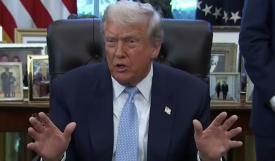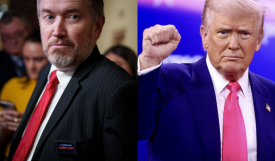Venezuela Sanctions May Stall, John Kerry Condemns Maduro and Opposition
As the violence continues in Venezuela and the dialogue between the sides stops dead on its tracks, the U.S. government continues to vacillate over sanctions against the Maduro administration. Well, the uncertainty comes from the administration since Congress is very eager.
Following in the footsteps of the House Foreign Relations committee, the Senate's counterpart approved its own set of sanctions against Venezuela, reports the Latin American Herald Tribute. In a vote of 13-2, the committee approved the measure with only Senators Bob Corker (R-TN) and Tom Udall (D-NM) in the opposition.
"Today we took an important step forward to punish human rights abusers in Nicolás Maduro's regime," said one of the bill's co-sponsor's Senator Marco Rubio. "The Venezuelan people have suffered enough under the incompetence of Hugo Chávez and now Nicolás Maduro."
This bill will allow the president to freeze assets and ban U.S. visits by current and former Venezuelan government officials who are responsible for "directing significant acts of violence or serious human rights abuses against persons associated with the anti-government protests in Venezuela."
Although having been supported by both houses, the sanctions may die at President Obama's desk. The president has encountered considerable pressure from both sides on the issue, according to the AP. While congressmen on both sides of the aisle want the sanctions, South American nations do not think they will be useful. Two countries in particular, Brazil and Argentina, have expressed their support for Maduro and moderate counties do not think the sanctions will benefit the peace talks.
According to Chris Sabatini, who spoke with the AP, the administration's reluctance may also stem from fears of alienating the region. Too many South American governments sanctions against Venezuela's government would be similar to the Cuban embargo.
"The bottom line ... is isolation," Sabatini said. "Something does have to be done, but it can't be done by the U.S. acting unilaterally."
The government cannot allow itself to be shut out from the region as it continues to develop and its economy blossoms. In an attempt to broach the regional divide, Secretary of State John Kerry visited Mexico. He expressed the government's withering patience on the topic and asked the Maduro government to find a way to deescalate the situation.
"Our hope is that sanctions will not be necessary. Our hope is that we can move in the direction of a reconciliation and a political path forward," Kerry said during a news conference, according to the Washington Post.
The ball now is in Venezuela's court, but Maduro seems unwilling to budge, calling the proposed sanctions "detestable." Yet, Kerry said that sanctions would be used if no progress were made.
"What is important for the Venezuelan government now is to honor the dialogue process, and to restore the civil liberties of opposition leaders who have been unjustly imprisoned," he said.
Subscribe to Latin Post!
Sign up for our free newsletter for the Latest coverage!
© 2025 Latin Post. All rights reserved. Do not reproduce without permission.















